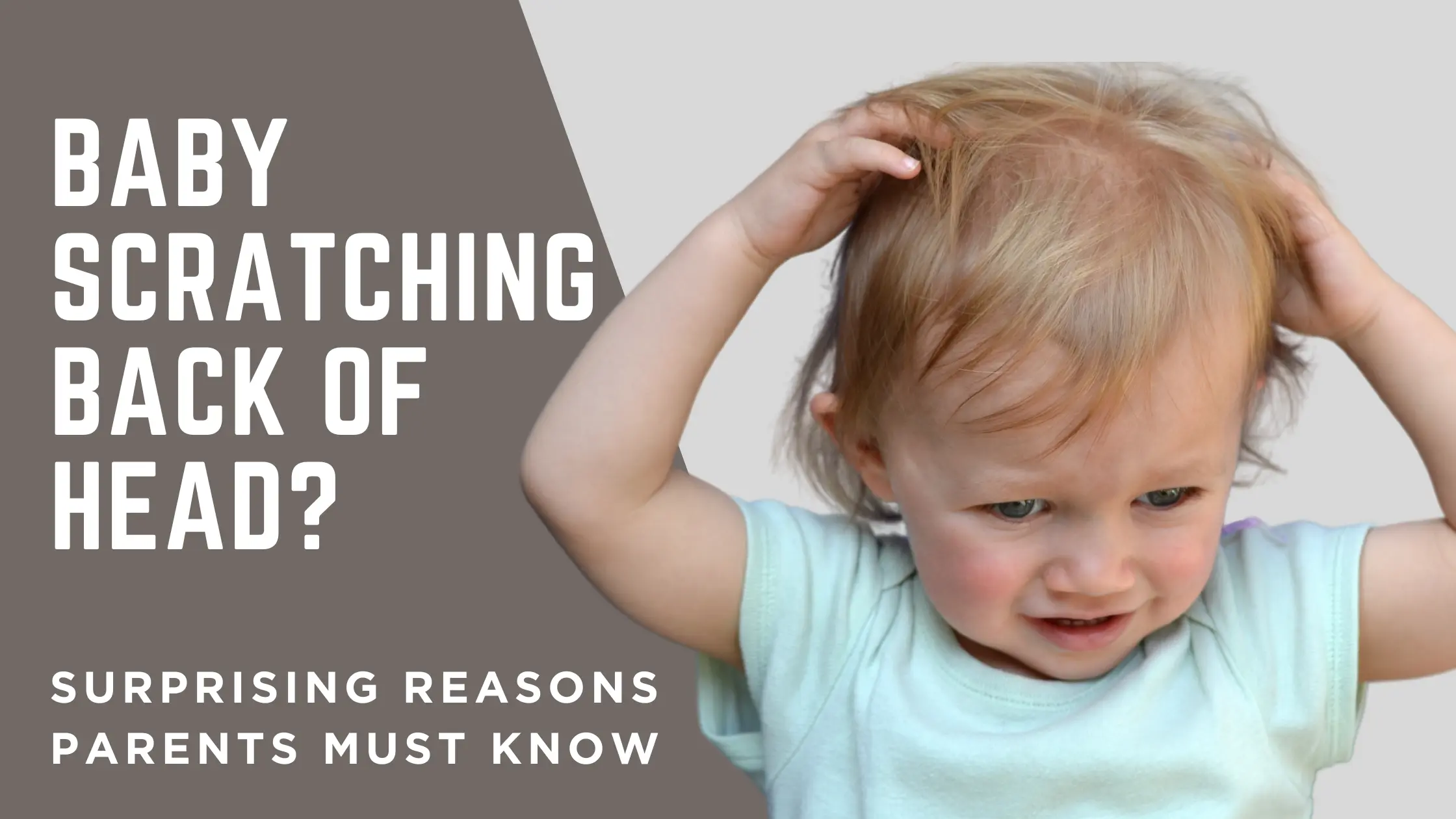Baby scratching back of head is something almost every parent notices at some point. It looks odd, but for newborns, 4-month-olds, or toddlers, it’s usually nothing to worry about. Head scratching is just part of growing up.
Here’s why babies scratch their heads, when to call the doctor, and how to keep your little one comfortable.
Table of Contents
- Understanding Why Babies Scratch Their Head
- Common Reasons for Baby Scratching Back of Head
- Signs You Should See a Doctor
- How to Stop Baby from Scratching Head
- Age-Specific Guide
- Preventive Baby Care Tips
- The Role of Sleep and Comfort
- Environmental Factors That Trigger Scratching
- When Scratching Becomes a Habit
- Head Scratches Meaning: Decoding Baby Behavior
- Supporting Skin Health Through Nutrition
- When to Seek Medical Advice
- Long-Term Outlook
- Frequently Asked Questions (FAQ)
- Final Thoughts
Understanding Why Babies Scratch Their Head
Babies’ skin is very delicate. Their body and scalp are still adjusting to life outside the womb. Therefore, scratching may result from mild irritation, dryness, or even just plain curiosity.
Most of the time, head scratching isn’t a problem. Babies scratch to explore, self-soothe, or deal with a small itch. Knowing the main reasons helps you handle it.
Common Reasons for Baby Scratching Back of Head
1. Dry Skin and Scalp Irritation
Dry skin is a top reason babies scratch their heads. Their scalp dries out fast, especially in winter or dry weather. Too many baths or scented shampoos can strip away natural oils and make things worse.
Moisturize the scalp and skip harsh soaps to cut down on scratching.
2. Cradle Cap (Infant Seborrheic Dermatitis)
Yellowish or white scaly patches on the scalp are known as cradle cap. Although it is not harmful, the flakes on the scalp can feel itchy or tight, causing your infant to scratch their head.
You may notice this in the first few months, and it will typically resolve by the first year on its own. Gently loosen flakes with a soft baby brush and mild shampoo.
3. Eczema (Atopic Dermatitis)
Red, rough patches from scratching could mean eczema. Eczema dries out the skin and can be itchy, even more so when it occurs on the scalp, cheeks, or folds of the skin. Often, babies with eczema will rub or scratch their heads and face.
4. Self-Soothing or Tiredness
Lots of babies scratch the back of their heads when they’re tired. It’s a self-soothing move, like sucking a thumb or rubbing their eyes.
If your baby scratches before naps or bedtime, it’s just their way of winding down. Keep nails trimmed to prevent scratches.
5. Developing Motor Skills
A 4-month-old scratching their head is often just exploring. At this age, babies love grabbing and touching whatever they can—including their own head.
6. Allergic Reactions or Sensitivity
Sometimes, scratching is from a mild allergy. Baby’s scalp can get irritated with shampoos, detergents, or some fabrics. Try hypoallergenic things and see if it helps.
7. Heat Rash
Babies get heat rash easily, especially on the head and neck. If you see small red bumps after sleep or wearing a hat, it’s likely heat rash. Keep your baby cool and dry to help prevent it.
8. Ear or Teething Discomfort
If your baby scratches the back of their head or tugs at their ears, it could be a sign of teething or ear pain. Teething can make the scalp and jaw feel sore. If you notice fever or extra fussiness, check with your doctor.
9. Habit or Sensory Comfort
As babies grow, some behaviors become habits. Some babies keep scratching their heads out of habit, especially when they are older. Soothing and gentle redirection generally works best in these situations. A baby touches and scratches its head in order to learn how it feels and what it is. It is normal for infants to scratch their heads, probably starting between the ages of three and six months when their coordination is developing.
If scratching is constant, breaks the skin, or causes redness or bleeding, check with your pediatrician. Ongoing scratching could mean a skin issue that needs attention.
Signs You Should See a Doctor
Most of the time, scratching is harmless. But call your pediatrician if you see any of these signs:
- Red, swollen, or crusty areas on the scalp
- Bleeding or oozing due to scratching
- Persistent dryness or flaking that worsens
- Baby appears uncomfortable or loses sleep
- Accompanying fever or ear-tugging
- Toddler scratching head no lice, but skin looks irritated or inflamed
These signs could mean eczema, an infection, or another skin problem that needs a doctor’s care.
How to Stop Baby from Scratching Head
1. Trim Nails Regularly
Baby nails grow fast and get sharp. Keep them short and smooth with baby nail scissors or a file. For newborns, use soft mittens or long-sleeved onesies with fold-over cuffs to protect their skin.
2. Keep the Scalp Moisturized
Use a gentle, fragrance-free lotion or oil after bath time, while the skin is still damp. For cradle cap, massage in a little baby oil before the bath to loosen flakes.
3. Use Mild Hair and Bath Products
Pick shampoos and cleansers without sulfates, parabens, or fragrance. Go for products made for sensitive skin. Skip adult shampoos—they’re too harsh for babies.
4. Bathe Strategically
Daily baths can dry out the scalp. Most babies only need a full bath two or three times a week. In between, wipe the scalp and neck with a damp, soft cloth.
5. Adjust Room Conditions
If your home’s air is dry, especially in winter, consider using a humidifier. A comfortable humidity level (around 40–50%) prevents scIf your air is dry, especially in winter, use a humidifier. Aim for 40 to 50 percent humidity to keep your baby’s scalp comfortable and help them sleep.tation around the neck and head area.
7. Keep Track of Patterns
If your baby scratches at certain times—after a bath, meal, or nap—write it down. Patterns can help you spot triggers like shampoo, fabric, or food.
8. Soothe Your Baby
If scratching happens when your baby is tired, set up a calming bedtime routine. Gentle rocking, dim lights, soft music, and a comfy sleep space can help cut down on scratching.
Age-Specific Guide
Newborn Scratching Head
Newborns scratch their heads because they can’t control their arms yet. Reflexes make them swipe at their face and scalp. Keep nails short and hands covered to prevent scratches.
4-Month-Old Scratching Head
A 4-month-old scratching their head is usually just exploring. Babies this age love feeling new textures, even their own hair. Watch for redness or dryness, but don’t stress unless it gets out of hand.
6-Month-Old Scratching Head
At six months, eczema can show up. If your baby seems upset or you see rough patches, moisturize more often or check with your pediatrician.
Toddler Scratching Head (No Lice)
If your toddler keeps scratching their head and there’s no lice, it’s probably dry skin, allergies, or just a habit. Reassure them and stick to a gentle scalp routine. If scratching keeps up, try calming bedtime or quiet time.
Preventive Baby Care Tips
Preventing head scratching comes down to comfort and routine:
- Moisturize daily with a gentle lotion
- Keep scalp clean but not overly washed
- Avoid fragranced detergents and fabric softeners
- Maintain proper room humidity
- Use cotton hats and bedding
- Keep the baby’s nails short and clean
- Observe any pattern in scratching behavior
A few small daily steps go a long way.
The Role of Sleep and Comfort
If your baby scratches their head when sleepy, it’s just a sign they’re tired. Babies rub or scratch to calm down. A steady bedtime routine helps cut back on this.
For example:
- Start with a warm bath
- Apply a gentle moisturizer
- Dress your baby in soft pajamas
- Dim lights and play calming sounds
A steady bedtime makes it easier for your baby to fall asleep and scratch less.
Environmental Factors That Trigger Scratching
Even spotless homes can have things that trigger head scratching. Watch out for:
- Low humidity, causing dry air
- Laundry detergent residues on clothes or sheets
- Overheating during naps
- Exposure to pet dander or pollen
- Rough clothing fabrics
When Scratching Becomes a Habit
Sometimes babies scratch their head just out of habit, not because anything’s wrong. It’s like thumb sucking—scratching can feel relaxing or help them fall asleep.
As long as this scratching is gentle and does not break skin. If you notice any marks or scratches, distract your baby using a soft toy, a gentle rub on the head, or a cuddle.
For toddlers, show them how to use a gentle touch instead of scratching.
Head Scratches Meaning: Decoding Baby Behavior
Parents often wonder if head scratching means something serious. Most of the time, it doesn’t. Scratching is usually just:
- A response to an itch (from dry skin or cradle cap)
- A way of exploring new sensations
- A self-soothing signal for sleepiness
- A mild reaction to environmental irritation
Supporting Skin Health Through Nutrition
Healthy skin starts from the inside. Breast milk or formula gives your baby the fats they need for a strong skin barrier. When your baby starts solids, add foods with omega-3s—like pureed salmon or flaxseed, if your doctor says it’s okay—to help keep skin hydrated.
Keep your baby well hydrated to help prevent dry skin and scalp.
When to Seek Medical Advice
Call your pediatrician if your baby’s scratching is:
- Continuous and intense
- Leading to bleeding or scabs
- Combined with rashes or bumps
- Affecting sleep or mood
- Accompanied by ear pain or fever
Long-Term Outlook
For most babies, head scratching is just a phase. As they grow and their skin gets stronger, the habit fades. With gentle care, it usually disappears by toddlerhood.
If scratching continues past age two without visible skin problems, it may be a behavioral issue. If scratching keeps up past age two and there’s no skin problem, it’s probably just a habit. Be patient, redirect as needed, and keep routines calm. Your baby’s fussiness is often due to dry skin, cradle cap, or self-soothing habits. See if your child’s skin is red or flaky and make changes accordingly.
Frequently Asked Questions (FAQ)
- Why does my baby scratch his head constantly?
It’s often due to dry skin, cradle cap, or self-soothing habits. Check for redness or flaking and adjust your baby’s skincare routine as needed. - Is it normal for my baby to scratch the back of his head?
Yes, especially during sleep or when tired. Babies often scratch the back of their heads as a comfort motion. - How can I stop my infant from scratching his head at night?
To avoid fidgeting at night, keep nails trimmed and use mittens. Also, apply scalp oil before bed. And maintain a calming bedtime routine. - My toddler keeps scratching head but has no lice. Why?
This could be due to dryness, eczema, or a habit. Check for any environmental triggers, use shampoo and moisturizers. - Why does my 4 month old keep scratching head?
At four months, it’s likely exploration or self-soothing. However, if the skin appears irritated, dryness, or cradle cap may be contributing factors. - Should I worry about infant scratching head causing hair loss?
Occasional scratching won’t cause lasting hair loss, but persistent scratching or infection can. See a pediatrician if you notice bald spots or sores on your child’s skin. - Can teething make my baby scratch his head?
Yes, teething can cause referred discomfort around the head and ears, prompting scratching. - How can I tell if my baby’s scratching is from eczema?
Look for red, dry, or rough patches on the scalp or face. If moisturizing doesn’t help, consult your doctor. - How long will my baby scratch their head?
Most little ones kick the habit by the time they are 12 to 18 months old after their motor control and skin barrier develop.
Final Thoughts
Seeing your baby scratch the back of their head can be worrying, but it’s almost always normal. Most of the time, it’s just your baby learning and growing. With gentle care and a little patience, you can keep them comfortable and stop small issues from turning into big ones.
Explore more on Pregnancy Must –
- Newborn Healthy Temperature: Can You Spot the Danger Signs?
- When Do Babies Start Teething? Celebrate That First Little Tooth
- Newborn Choking on Milk While Bottle Feeding: Act Fast!









